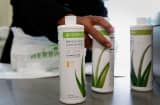
Herbalife lowered its sales outlook for the current quarter early Monday, as it gears up for tougher new Federal Trade Commission regulations that appeared to hurt business more than anticipated.
Herbalife now expects revenue to be lower than prior estimates, with a key sales metric known as volume points expected to be 3 percent below its earlier view. Earnings per share were actually increased for the quarter and the full year.
Herbalife expects adjusted profit of 95 cents to $1.15 per share in the second quarter ending June 30, compared to the 88 cents to $1.08 per share it expected earlier.
The company said the transition to the new FTC rules along with softness in Mexico was to blame for the lowered numbers.
“Whenever we introduce change in the marketplace there is typically a short-lived slowdown in sales followed by a return to growth,” Herbalife spokesman Alan Hoffman said in an email. “We believe this is a short-term episode and that the second part of 2017 will pick up.”
The news comes only about a week after Herbalife had to begin adopting stricter new regulations mandated the FTC as part of its landmark settlement with the company back In August 2016. As part of that deal, Herbalife agreed to a $200 million fine, the biggest ever imposed by the commission, and stricter new rules related to how it accounts for sales of its nutritional products.
Herbalife must now prove that at least 80 percent of its sales are made outside the company’s distributor network, with a small portion of that number allowed for personal consumption by the nearly 300,000 distributors in the U.S. Those distributors must also provide receipts for their sales to show they have legitimate end customers. In addition, the company agreed to an outside monitor for seven years to make sure it complies with the new rules.
Though the company said preparing distributors for the new regulations likely impacted sales, there was a silver lining in the disappointment. Herbalife said it easily exceeded the new FTC threshold, showing that 90 percent of sales since May 1 have met the new guidelines.
“We knew we would be able to meet the threshold test of 80 percent because we knew we had real customers,” Hoffman said.
The company said it could also show that it has 400,000 so-called “preferred” members in the U.S. who buy products at a discount and aren’t pursuing the business opportunity in any way.
Though the cut in guidance could give the activist investor William A. Ackman renewed ammunition in his claim that Herbalife’s business will suffer under the weight of the FTC’s new rules, the strength of documented sales from outside the company’s distributor base runs counter to his claims that Herbalife has no “real” customers.
“These figures should put an end to any questions regarding demand for our nutritional products and the strength of our go-to-market business model,” said Richard P. Goudis, Herbalife’s new CEO.
Ackman has been short Herbalife shares since 2012, but has lost money on the investment as the stock has traded much higher than he expected. Part of that has to do with rival billionaire Carl C. Icahn, who famously took the other side of Ackman’s Herbalife trade and remains one of the company’s most powerful financial supporters. Icahn and Ackman famously brawled on live television in January 2013 and are still at odds over the company’s future. Icahn has bought more shares in recent months to increase his stake to nearly 25 percent.
When reached by phone on Sunday night and asked to respond to the coming announcement, Icahn said he wasn’t alarmed by the lowered sales outlook for the quarter but rather emboldened by the strength of the documented sales and the fact that earnings guidance for the June period and the full-year were taken higher.
“I think this validates the fact that people use the product who are not distributors and it makes any claim against that absurd,” said Icahn. “But more importantly I think it’s ironic, but factual, that as a result of the propaganda against the company that it now has a much better idea of who their customers are and it opens the door for Herbalife to greatly benefit from e-commerce. Many people in my office use and truly like the products. To digress, it’s sort of funny that at times throughout the last four years I felt almost compelled to add to my position when the stock was depressed because of inaccurate rumors out there that I was selling. Obviously, the stock I purchased is much higher today. I haven’t sold a single share.”
[Source”cnbc”]

